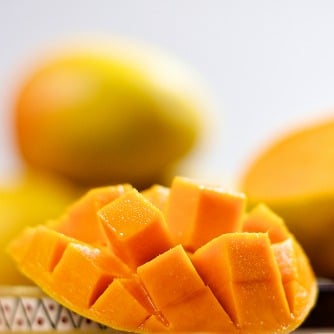Abundant in the antioxidant vitamins C and A, and folate, mangos are a good source of fiber, copper, and vitamin B6. Edralin Lucas, from Oklahoma State University (Oklahoma, USA), and colleagues completed a 12-week study involving 20 adults, ages 20 to 50 years, with a Body Mass Index (BMI) of 30 to 45 kg/m2. The study subjects were asked to maintain their usual diet, exercise habits, and regimen of regularly prescribed medications. Each day during the study period, participants consumed 10 grams of freeze-dried mango (Mangifera indica L.). Dietary intake was monitored at the study’s start and after 6- and 12- weeks of mango supplementation. Anthropometric measurements (height, weight, and circumference of waist and hip) were measured at those same timepoints. Body composition and blood analyses of fasting blood triglyceride, HDL-cholesterol, glucose, hemoglobin A1c, and plasma insulin concentration were evaluated at baseline and at the end of 12 weeks of mango supplementation. The researchers found that after 12 weeks, participants had reduced blood glucose (-4.41 mg/dL). While no changes were observed in overall body weight, hip or waist circumference, waist to hip ratio, percent fat mass, and lean mass, hip circumference was significantly lower in males (-3.3 cm,) but not females; BMI tended to be higher in females (+0.9 kg/m2) but not males, after mango supplementation. The study authors report that: “Our findings indicate that regular consumption of freeze-dried mango by obese individuals does not negatively impact body weight but provides a positive effect on fasting blood glucose.”
Mangos Moderate Blood Sugar
Shirley F. Evans, Maureen Meister, Maryam Mahmood, Heba Eldoumi, Sandra Peterson, Edralin A. Lucas, et al. “Mango Supplementation Improves Blood Glucose in Obese Individuals.” Nutrition and Metabolic Insights, 2014:7, 77-84, 28 Aug. 2014.
RELATED ARTICLES




